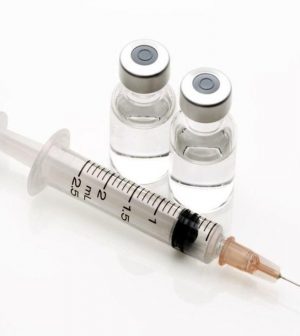- 10 Strategies to Overcome Insomnia
- Could Artificial Sweeteners Be Aging the Brain Faster?
- Techniques for Soothing Your Nervous System
- Does the Water in Your House Smell Funny? Here’s Why
- Can a Daily Dose of Apple Cider Vinegar Actually Aid Weight Loss?
- 6 Health Beverages That Can Actually Spike Your Blood Sugar
- Treatment Options for Social Anxiety Disorder
- Understanding the Connection Between Anxiety and Depression
- How Daily Prunes Can Influence Cholesterol and Inflammation
- When to Take B12 for Better Absorption and Energy
Mix n’ Match COVID Vaccine Strategy Works Well: Study

Mixing and matching different types of COVID-19 vaccines is highly effective, new research shows.
The study found that protection against infection was stronger in people who received a first dose of the AstraZeneca vaccine and a second dose of an mRNA vaccine than in those who received two doses of the AstraZeneca vaccine.
The AstraZeneca vaccine is a vector-based vaccine, while the Moderna and Pfizer vaccines are mRNA vaccines.
“Having received any of the approved vaccines is better compared to no vaccine, and two doses are better than one,” said researcher Peter Nordström, professor of geriatric medicine at Umeå University in Sweden.
“However, our study shows a greater risk reduction for people who received an mRNA vaccine after having received a first dose of a vector-based, as compared to people having received the vector-based vaccine for both doses,” he said in a university news release.
Previous research showed that mix-and-match vaccine schedules trigger a strong immune response, but it wasn’t clear whether that translated into a reduced risk of infection.
To find out, Nordström and colleagues analyzed data from about 700,000 people in Sweden, where use of the AstraZeneca vaccine was halted for people younger than 65. It was recommended that all people who had already received that vaccine as their first dose get an mRNA vaccine as their second dose.
Over an average follow-up of 2.5 months after a second dose, the risk of infection was 50% lower in those who received two doses of the AstraZeneca vaccine, 67% lower in those with a combination of the AstraZeneca and Pfizer vaccines, and 79% lower in those with a combination of AstraZeneca and Moderna, compared to unvaccinated people.
The researchers also noted that the Delta variant was dominant in Sweden during the study period.
In addition, the study authors said that there were low rates of blood clots among all the vaccinated people in the study, and that the number of COVID-19 cases severe enough to require hospitalization was too low to be able to calculate the effectiveness of the different vaccine combinations against this outcome.
According to study co-author Marcel Ballin, “The results of the study may have implications for vaccination strategies in different countries.” Ballin is a doctoral student in geriatric medicine at Umeå University.
“The World Health Organization has stated that despite the promising results from previous studies regarding immune response from mix-and-match vaccination, there is a need for larger studies to investigate their safety and effectiveness against clinical outcomes. Here we now have one such study,” he added.
More information
The U.S. Centers for Disease Control and Prevention has more on COVID-19 vaccines.
SOURCE: Umeå University, news release, Oct. 18, 2021
Source: HealthDay
Copyright © 2026 HealthDay. All rights reserved.










